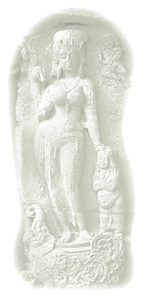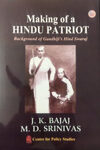Sri K. N. Govindacharya
Born in 1944 at Tirupati
Parents and Family
Father: Kodipakkam Varadacharya Neelameghacharya
Mother: Lakshmi Ammal
Father was a Sanskrit scholar and teacher, who came to Kashi in the mid-forties and in due course became Head of the Ramanuja Vedanta Department at Sampoornananda Sanskrit Vishwa Vidyalaya. Money in the family was always short. Mother had to run a family of four brothers and three sisters with great difficulty; and in the process had to ignore her health. The three senior brothers grew up to be Sanskrit scholars and teachers.
In spite of the difficulties in the family there was an atmosphere of Sanskrit learning and traditional literature. There used to be discourses on Ramayana and Mahabharata, and readings from the various issues of Kalian.
Education: Completed M.Sc. in Mathematics from Banaras Hindu University in 1962 and worked as a Research Fellow from 1962-65, before joining the Rashtriya Swayamsevak Sangh full-time as Pracharak.
Public Life
Before 1960: Became politically aware from 1957 onwards while studying in the 9th standard at school; there was an initial fascination for communism and some dabbling with the CPI and AISF; later there was also some interest in socialism as propagated by George Fernandez. But, with the Chinese aggression there was a turning away from the leftist ideologies.
1960: Became swayamsevak of the Rashtriaya Swayamsevak Sangh in 1960 under the influence of Prof. Sharada Sharan Singh of the BHU. Prof. Sharan presented the RSS as a patriotic organisation; he emphasised that a nation rises only with the rise of patriotism amongst the ordinary people; he also emphasised that the education must inculcate Indian values and patriotism amongst students so that they may become responsible citizens committed to the task of building a great Indian Nation.
1961: Was introduced to the Sri Bhau Rao Deoras and Eknath Ranade.
1962-1964: Completed the Sangha training.
1965: Joined the Sangha as Parcharak in July 1965. Was assigned to work in Banaras for the first six months. Transferred to Bihar in December 1965.
1965-74: Shakha work in Bihar; became Patna Vibhag Pracharak.
March-June 1974: Became involved in the emerging JP movement, without formal direction or decision by the Sangha. Shakha work had in any case become impossible.
July 1974: Informal approval by the Sri Bala Sahib Deoras to continue work in the JP movement. Sri Deoras felt that the movement was unlikely to become a means for organising Indian state in accordance with the Indian civilisational consciousness, Indian chitti; he felt that the movement might lead to the emergence of some kind of social deterrence against the highhandedness of the state, but it was unlikely to achieve more than that. But, he in any case approved of involvement in the movement.
1974-1977: Engaged in organising the JP Movement in Bihar. Was arrested in November 1974, and released on the intervention of the High Court after about three months. In April 1976 was assigned to the Akhil Bharatiya Vidyarthi Parishad. Looked after Uttar Pradesh and Bihar during the elections that followed the lifting of the Emergency.
1977-1981: Zonal Organising Secretary, Akhil Bharatiya Vidyarthi Parishad, Central Zone.
1981-1986: In-charge of ABVP in the South.
1986-1988: Political work through the Rashtriya Sangharsh Morcha. Worked towards the emergence of V. P. Singh in opposition to Rajiv Gandhi.
1988: Assigned to Bharatiya Janta Party in October 1988 on the request of Sri L. K. Advani.
1990: Involved in the organisation of Sri L. K. Advani’s ratha-yatra in September-October, 1990. Held the organisational command at Delhi, while Pramod Mahajan accompanied the yatra.
1991: Became General Secretary of BJP and in-charge of April 1991 elections; BJP gained 120 seats in the Lok Sabha. Central Steering Committee member of Swadeshi Jagaran Manch since its inception in 1991.
1992: Assigned for BJP work at Chennai in April. In the same month, Sri Bhau Rao Deoras, political mentor of Sri Govindacharya expired.
1993-1994: Given organisational charge of four southern states in June 1993.
1994-1999: In-charge of Bihar and Orissa with effect from April 1994 with headquarters at Delhi. Given additional charge of cadre-training with effect from 1996.
1999-2000: In-charge of Uttar Pradesh and Rajasthan
September 2000: On study leave from the BJP
April 2003: Decided not to become member of any political party



